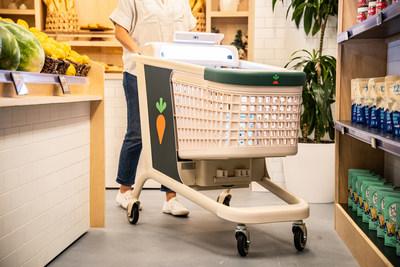Instacart offers full omnichannel experience with in-store platform
Instacart is keeping its promise to enable grocers to build the “store of the future.”
The company has unveiled Connected Stores — a bundle of new and existing Instacart Platform technologies intended to help grocers build a unified, seamless and personalized experience — online and in-store. The new initiative comes as Instacart has been taking steps in the past year suggesting it wants to join major technology providers such as Amazon, Apple, Google and Facebook, has evolved into an omnichannel tech platform.
Launched in March 2022, Instacart Platform offers a range of enterprise technologies (such as e-commerce storefronts and fulfillment solutions) retailers can use a la carte or as a suite.
[Read more: Instacart launches Amazon-style e-commerce platform]
The first Instacart Platform-powered Connected Store Good will launch at a Bristol Farms grocery store in Irvine, Calif., in the coming months. (Bristol Farms is part of Good Food Holdings, which operates several banners in California, Washington and Oregon.). Leveraging its Storefront Pro e-commerce solution, Instacart will support Bristol Farms' online store and connect it to the retailer’s physical store. All six elements (see below) of Connected Stores will come together to deliver a seamless experience for customers at this store, which will open in the coming months.
Instacart's Connected Stores offering includes the following:
- The newest model of Caper Cart, an AI-powered smart cart Instacart acquired in October 2021 which is equipped with scales, sensors, touchscreens, and computer vision technology. The screen helps shoppers navigate the store, and proprietary scanless technology allows customers to drop them in the cart to be checked off a premade online list. Shoppers can bag as they go, and check out right from the cart. The new Caper Cart is slimmer, lighter, and holds 65% more than the previous version, and will be rolling out in the coming months. It also offers stacked charging (a line of carts can all be pushed together with only the front cart plugged in), meaning grocers don’t have to charge carts individually or swap out batteries.
- A scan & pay feature which lets customers scan items as they shop and pay for them using their mobile phone. It also links the items customers buy in-store to their online account, so it’s easier to buy them again.
- Carrot Tags, which enable retailers to connect electronic shelf labels to Instacart Platform to add functionality such as pick-to-light capabilities, which allow customers, associates, or Instacart shoppers to select an item on their phone and flash a light on its corresponding shelf tag, making it easier to find the products they're looking for. Carrot Tags also help retailers display key information – like whether a specific product is gluten-free, organic, kosher, or EBT SNAP eligible.
- FoodStorm's order management system (OMS), which Instacart acquired in October 2021, helps retailers manage orders for items such as baked goods, hot items, and deli sandwiches while customers are shopping. The new Department Orders function enables different prepared foods departments within a store to collaborate so that they can have customers' orders ready at just the right time.
- Out of Stock Insights is an API that helps retailers provide automatic, real-time alerts to associates when items are running low or out of stock.
In May 2022, Instacart unveiled a 10-year strategy. As part of the plan, Instacart says it will provide grocery retailers the latest innovations and insights in e-commerce, fulfillment, in-store and advertising, to enable them to build the “store of the future.”
During a virtual Connected Store demo conduced for Chain Store Age, David McIntosh, VP of Connected Stores for Instacart, discussed how Connected Stores is part of the company’s “natural evolution” as a technology platform.
“Act one was delivery,” said McIntosh. “We want to take some things into the stores and be a technology provider for retailers as part of a long-term shift.”
In a statement, Neil Stern, CEO of Good Food Holdings., discussed his company’s rationale for deploying Connected Store.
"At Good Food Holdings, we're proud to provide our customers with a personalized shopping experience – whether they're opting to build their baskets online or joining us in-store,” said Stern. “As customers have adopted delivery and pickup over the past year, we've found it increasingly important to evolve our business with omnichannel customers at the forefront. As we look to the next decade of grocery, we want to make sure that we're providing an inspirational shopping trip for our customers – and this starts by building a Connected Store.
In partnership with Instacart, we're excited to introduce multiple ways to checkout with Caper Cart and scan & pay, while driving inspiration through Lists and Carrot Tags," Stern said. "Instacart is an innovator in grocery technology, and we're thrilled to be their partner and debut the first-ever Connected Store at Bristol Farms this year."
"We believe the future of grocery won't be about choosing between shopping online and in-store - consumers are going to do both," said Fidji Simo, CEO of Instacart. "The launch of Connected Stores is another exciting step for Instacart as we partner with retailers to help invent the future of grocery. Through these technologies, we can now offer consumers the best of online shopping inside physical stores, and vice-versa. Ultimately, we believe that the more customers connect with grocers across both online and in-store experiences, the more retailers' businesses will grow."



